Goodwill of Greater Washington and AHC Inc. are teaming up to build affordable housing above a new second-hand store and donation center on S. Glebe Road.
DC Urban Turf first reported the news.
The national nonprofit has not embarked on something like this before, writes land-use attorney Andrew Painter, in application materials filed with Arlington County.
“The proposed redevelopment would be the first such project for the organization as it seeks to further its nonprofit mission and values,” Painter said. “The proposal will also deliver a modern and efficient retail store and donation processing center for a successful nonprofit organization that provides important services and benefits to Arlington County’s disenfranchised populations.”
The nonprofit proposes to demolish the existing store at 10 S. Glebe Road in the Alcova Heights neighborhood and build a five-story, mixed-use building. There will be a Goodwill retail store and child care center on the ground floor, a donation processing center on the second floor and 128 apartments above that.
All of the units will be offered to households earning between 30-60% of the area median income for a period of 30 years, though the exact unit mix will be finalized during the financing process. About three-quarters of the affordable apartments consist of 2-3 bedroom units.
The units units will be available for a single person earning up to $63,300 and a family of four earning up to $90,420, according to the county.
AHC, which Painter says is Arlington County’s largest non-profit affordable housing developer, is its joint development partner and will oversee the apartment side of the building’s operations once construction is done. AHC will also choose the operator for the child care center.
“AHC hopes to replicate the success we’ve had in other communities,” AHC spokeswoman Jennifer Smith tells ARLnow. “That means bringing a mission-aligned childcare partner to the new Goodwill site, with priority enrollment for onsite residents and Goodwill Greater Washington employees, then availability to the larger community.”
Parking for residents, childcare, employee and overflow customer parking will be located in a 152-space underground garage. Retail, visitor and future resident parking will be in a 16-spot surface parking lot.
In preparation for the temporary closure of the S. Glebe site, Goodwill is currently negotiating a lease for an alternate donation drop-off location close by. That is expected to open in 2024.
Meanwhile, Painter says, Goodwill encourages its customers to shop or donate at its 20 other area locations, including a store on Columbia Pike.
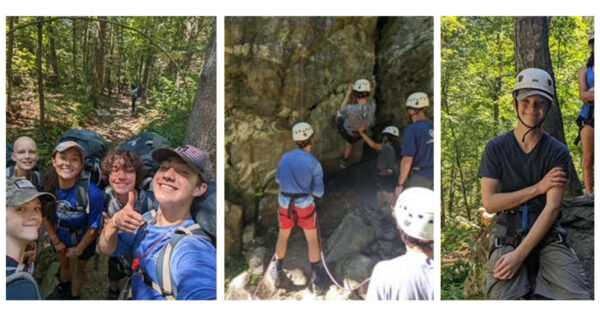
A nonprofit with ties to Arlington is offering free outdoor hiking and camping adventures for D.C.-area teens and tweens grieving the loss of a loved one.
Hope for Grieving Families is partnering with the educational nonprofit Outward Bound to send up to 30 tweens and teens on a one-day ropes course adventure and a group of eight to 10 high schoolers on a seven-day expedition in the Appalachian Mountains.
The deadline to apply for both programs is next Friday, May 19.
The program does not aim to provide counseling, but rather, an opportunity for teens to befriend feeling similar emotions.
“The friendships that have blossomed between these teens are so amazing,” Tara O’Brien, the executive director of Hope for Grieving Families, tells ARLnow. “It makes you feel like you’re doing something that means something, that is still impacting these families’ lives.”
In a press release, the nonprofit said one in 13 children will lose a parent by the time they are 18 and one in five will lose someone close to them by 18 — and that these children will experience grief differently than adults.
“For kids who have faced the immensely painful loss of a parent, sibling, or other loved one, the chance to connect with each other out in nature is an unforgettable, healing experience,” O’Brien said in a statement.
“Our participants learn from our guides and from one another, building resilience and self-advocacy skills,” she continued. “Most of all, these trips are an opportunity for grieving children to just experience some fun again, alongside other kids who are going through the same journeys of loss and healing.”
Jason Alford, of Outward Bound, says research shows most children who have experienced loss benefit from peer-to-peer support.
“Children can experience comfort from having others who understand grief and loss. Without a peer support group, children can feel anxious, isolated and overwhelmed,” he said in a statement. “Our expedition program with Outward Bound was designed with these evidence-based insights in mind.”
Hope For Grieving Families says it is the D.C. area’s only organization providing “family-focused grief programming” aimed at giving people new, positive memories and experiences after a loss.
Its founder, Becky Wagner, lives in Arlington and the nonprofit serves many from North Arlington and Northern Virginia more broadly, O’Brien said.
Clients come to the organization for a range of reasons, O’Brien tells ARLnow. Many have lost someone to suicide or a car accident, while for others, family members died after a bout with cancer.
“The thing that bonds them all is that they all understand they’re going through a grieving process,” she said. “They might not talk about the grief but they all understand what they’re going through.”
The nonprofit focuses on creating fun experiences for teens processing their grief. O’Brien says it is sensitive to current events that may trigger that grief, such as a recent shooting at a mall in Allen, Texas.
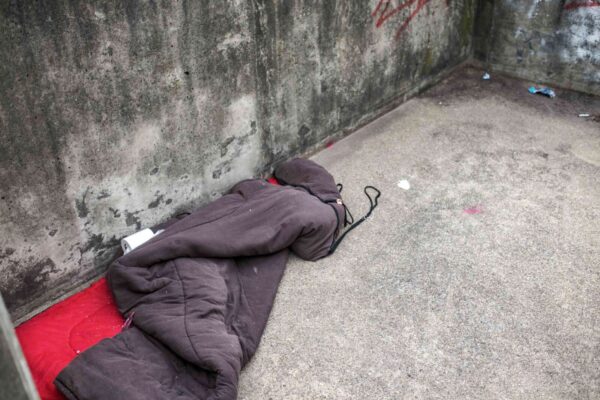
Arlington County says it provided assistance to 1,070 people who were experiencing homelessness or at risk of losing housing last year.
This number is five times higher than the number of people found living outside or in a shelter one night in January 2022. One night last winter, as part of the “point-in-time” count, 182 people did not have permanent, stable housing, according to a new report on homelessness in Arlington.
The recently released report says the larger figure more accurately captures the portion of the population experiencing homelessness in Arlington.
In a statement, Arlington County Dept. of Human Services Director Anita Friedman said that, without Covid-era eviction prevention efforts, the number of people who received services would have been higher.
“The total number of individuals served in FY 2022 was almost identical to pre-pandemic levels,” Friedman said. “Without strong eviction prevention efforts, we would have seen many more households upended and in crisis.”
Some $20 million in local, state and federal funding helped more than 3,400 households stave off eviction, according to the county.
The report comes as Arlington County embarks on a goal to bringing homelessness down to what it calls “functional zero” for several specific demographics. That means homelessness is “rare and brief” for a given population, such as young adults, families and survivors of domestic violence.
“For those households that do experience homelessness, it is traumatic, and we remain committed to working alongside them as they return to housing stability,” Friedman said. “We will also continue to address critical gaps, including in the areas of racial equity, immigrant and refugee households, and the aging population.”
Arlington County addresses homelessness through a network of programs and services it calls the Continuum of Care, or CoC. The report says that DHS staff and nonprofit program leaders have spent the last 10 years improving how the CoC prevents homelessness and finds permanent housing for people.
For instance, through the CoC, county and community partners work together to connect people to stable housing, jobs, childcare and emergency financial assistance, and provide behavioral health services to people living on the streets — a service that helped 65 people last year.
What homelessness looks like in Arlington
Of the 1,070 who received services through the CoC, there were:
- 744 single adults
- 105 families
- 36 veterans
- 74 young people aged 18-24
- 192 people in “chronic homelessness,” or individuals with a documented disability who have experienced at least 12 months of homelessness in one stretch or at least four times in less than three years
Excluding people in Arlington’s shelter for people escaping domestic violence, run by the nonprofit Doorways, 305 people were served in Arlington shelters. This includes 13 veterans and 25 chronically homeless individuals. The average length of stay was three months.
Meanwhile, the county report says demand for safe housing among domestic violence survivors — including individuals and families — is increasing.
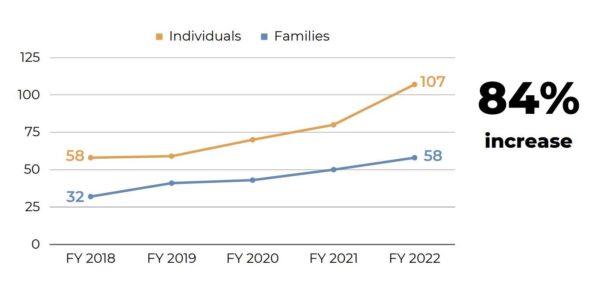
While some 165 people received shelter at Doorways, the number of people who called its hotline was much higher: advocates counseled people on domestic and sexual violence during a total of 1,039 calls, per the report. Most of the time, people leaving these situations are women.
“Domestic violence is one of the leading causes of homelessness for families, and the leading cause of homelessness for women,” the report says.
Women are also more likely to be at the head of a family experiencing homelessness, per the report. Of the families counted one night in January, women were the adult in the family 95% of the time.
Meanwhile, 78% of homeless individuals were men and 1% identified as transgender.
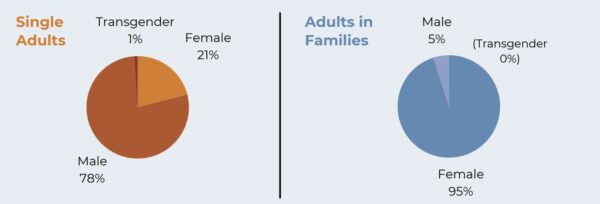
(Updated at 4:50 p.m.) After a pandemic-era hiatus, Habitat for Humanity has revived plans to turn a county-owned historic farmhouse into a group home.
Habitat DC-NOVA and HomeAid National Capital Region are propose to restore the exterior of the Reeves Farmhouse in the Bluemont neighborhood, modernize and renovate the interior, construct two new, historically compatible additions and update the landscaping.
The public would still be able to use two acres of parkland around it, including a milk shed, sledding hill and the Reevesland Learning Center gardens.
The nonprofits will be meeting with the Historic Affairs and Landmark Review Board tonight (Wednesday) to discuss plans for the home, which is more than 100 years old. Given the home’s local historic district designation, this board has the authority to review and approve major alterations, per a county report.
The farmhouse sits on the Reevesland property, notable for being the last operating dairy farm in Arlington County before closing in 1955. The local historic designation of the farmhouse and milk shed , from 2004, recognizes the property’s “architectural history and association with the rural and agricultural history of Arlington,” the report said.
“The Reevesland farmhouse is a two-story building with a stone foundation,” the report says. “The wood framing remains as underlying physical evidence of a number of additions and remodeling undertaken over more than 100 years, with the major changes occurring from 1878 to 1911.”
Arlington County purchased Reevesland in 2001 and began searching for appropriate uses for the “endangered” historic place in 2010, putting forth requests for proposals that never led anywhere. During these doldrums, some community groups suggested the county turn the property into a museum or learning center.
High renovation costs convinced the Board to move toward selling it in March 2017, despite some community opposition. Two months later, Habitat came to Arlington County with an unsolicited proposal to reuse the farmhouse for a group home for people with developmental disabilities.
It took three years, but the county and Habitat reached a non-binding letter of intent. One month after that was signed, the nation shut down due to the coronavirus pandemic and the project stalled.
Talks among the nonprofits and L’Arche Greater Washington — which will use the facilities for their core member program — and county staff about the project resumed in September 2022. DPR met with the Boulevard Manor Civic Association in January to provide an update on the project, a neighbor and a spokeswoman for Habitat told ARLnow after publication.
Plans include a two-story addition at the back of the house and a one-story addition at on the southwest side. These will increase the number of bedrooms to seven and provide access and gathering spaces suitable for people with mobility impairments.
A paved area west of the farmhouse will be expanded to provide parking and clearance for Metro Access vans that will provide transportation for future residents. It will also build a stormwater management bio-facility, which could be something like a rain garden.
A tree near the proposed two-story addition will be removed as the addition will conflict with some roots that are critical to its health. Habitat will discuss ways to mitigate this loss with the county’s Urban Forester.
In the county report, Historic Preservation Program staff say they support the project because the addition will be distinct from the historic structure and the landscaping changes will not harm the property’s setting.
“The proposed one- and two-story additions will not detract from the scale or massing of the historic farmhouse, as their designs are compatible with the existing vernacular architecture and can be distinguished from what is historic and new construction,” per a county report.

Local nonprofits and the Arlington County government have received $3 million in federal funding to address homelessness.
Nearly $200,000 will go to two new programs from the organizations Doorways and PathForward, formerly A-SPAN. The rest — save for about $81,000 for the county — will support existing programs provided by Bridges to Independence, Doorways, New Hope Housing and PathForward.
“This HUD funding helps ensure survivors of intimate partner violence have access to housing and additional pathways out of shelter, so that they can find healing, harbor, and hope for a brighter future,” Doorways President and CEO Diana Ortiz told ARLnow in a statement.
To date this year, Arlington has received $4.2 million from the U.S. Department of Housing and Urban Development to combat homelessness.
“HUD funding is a vital part of Arlington’s efforts to prevent and end homelessness,” said Arlington County’s Department of Human Services Director Anita Friedman in a statement.
“This announcement confirms that our strategic planning, policy development, and service delivery are effective and that we are changing lives for individuals and families who are experiencing homelessness or are at risk of becoming homeless,” she continued.
The county delivers these services in a partnership with local nonprofits called the Arlington County Continuum of Care (CoC). For more than a decade, the CoC has worked to improve the county’s response to homelessness by focusing on providing permanent housing, working with 1,070 people in 2022, per the county.
Nonprofits receiving this money will use it in one of two ways. The first, called “rapid rehousing,” places people living on the street or in an emergency shelter in existing, empty affordable apartment units. The second, called “permanent supportive housing,” combines housing with services such as health care and employment help.
The funding breaks down as follows:
- Doorways: $127,398 for a new rapid rehousing program
- PathForward: $1.85 million for four existing programs and $68,116 for a new permanent supportive housing program
- New Hope Housing: $586,269 for three existing programs
- Bridges to Independence: $289,419 for an existing rapid rehousing program
“HUD grant funding supports a broad array of interventions designed to assist individuals and families experiencing homelessness, particularly those living in places not meant for habitation, located in sheltering programs, or at imminent risk of becoming homeless,” per a county press release. “Because grants are competitive, localities must demonstrate need as well as an ability to address those needs.”
Arlington has demonstrated that ability in the past, when, in 2015, it functionally ended homelessness for veterans, according to a presentation on the county’s efforts.
That does not mean Arlington literally eradicated homelessness for former service members, however.
Rather, it means that the number of actively homeless veterans is less than or equal to the average monthly rate at which individuals and families find and move into stable housing, per the presentation. This is known as “functional zero.”
Arlington aims to reach functional zero for all populations experiencing homelessness by 2026, which would mean seven or fewer single adults and three or fewer youth and families with children actively experiencing homelessness at one time.
To reach this goal, Arlington is partnering with Community Solutions, which is a nonprofit dedicated to ending homelessness, and updating its strategic plan. As part of that process, the county held listening sessions earlier this year to discuss how homelessness affects specific population groups and hear solutions from the community.
In the presentation, Community Solutions representative Elise Topazian said Arlington is on the right track. Over the last 12 years, the Continuum of Care reduced overall homelessness by 66%, including a 52% reduction in sheltered and 90% reduction in unsheltered homelessness.
“Arlington is on the brink [of] ending chronic homelessness,” Topazian said.
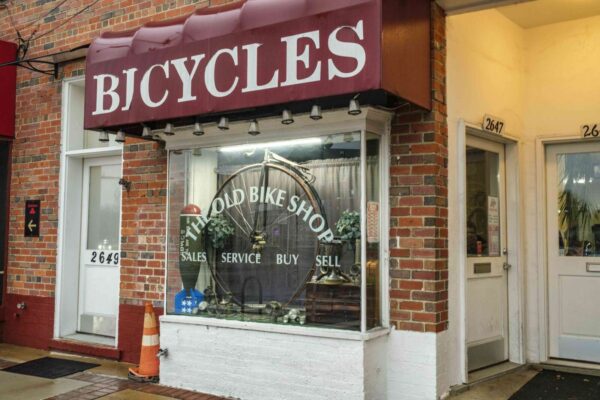
The Old Bike Shop closed earlier this year in Lyon Park, after a decade in business, but a new bike shop is moving in.
Vélocity Bicycle Cooperative, based at 2111 Mount Vernon Avenue in Alexandria’s Del Ray neighborhood, announced today that it plans to open at the 2647 N. Pershing Drive storefront — down the road from Clarendon — in the next couple of weeks.
“Thanks to Larry Behery and the Old Bike Shop for providing a home for quality used bike service and sales,” Vélocity co-founder Christian Myers said in a statement. “Vélocity will build on this legacy and make safe, reliable bicycles more affordable to everyone.”
“Vélocity plans to open the Arlington shop in early April,” a post on the nonprofit organization’s website says. “Until then, come see us at our location in the Del Ray neighborhood of Alexandria, Virginia, where you can find a refurbished used bike for the spring season!”
More from the organization’s post, below.
Vélocity Bicycle Cooperative is expanding efforts to build a strong biking community by opening a second location at 2647 North Pershing Drive, in the Lyon Park neighborhood of Arlington, Virginia, the same location where the Old Bike Shop operated for more than 10 years.
Vélocity is a non-profit cycling shop, run by volunteers. Since 2009, Velocity has empowered kids, beginners, and cycle enthusiasts in acquiring, building, and maintaining bicycles. Vélocity fosters a diverse cycling community, offers cycling education, and provides free bicycles and related equipment to those in need (in 2022, Vélocity refurbished 459 bikes and got 64 bikes to kids and scholarship recipients).
Joe Davison, Board Chair and long-serving volunteer, is excited about the days ahead: “Opening our second location provides a unique opportunity to realize our mission to grow and empower an inclusive biking community through education and affordability. We are honored to carry on and serve the local biking community at this location while seeking continued synergy among the area’s cycling organizations, including Phoenix Bikes.”
Arlington-based Phoenix Bikes, located just off of Columbia Pike, has a similar education and bike refurbishment mission.
We’re Expanding! This April, the Vélocity Bicycle Coop will open a second shop in Arlington, VA, where the Old Bike Shop operated for ten years: 2647 North Pershing Drive. Stay tuned for the opening date and celebration plans! For details, click the link. https://t.co/9sWmRgPlyV pic.twitter.com/P1eEQmrwcb
— Vélocity Bicycle Co-op (@velocitycoop) March 22, 2023
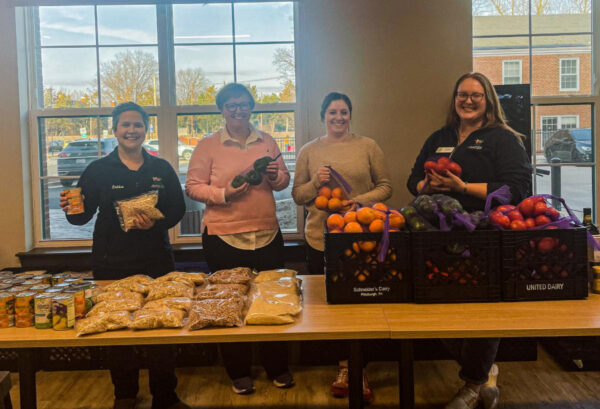
Like all the cool kids, the Arlington Food Assistance Center (AFAC) is expanding to Alexandria.
The nonprofit food pantry announced in a release that it is launching a new distribution center in The Waypoint at Fairlington, an affordable housing complex at 2451 Menokin Drive that opened last year.
“This is a major step for AFAC in moving beyond Arlington to nearby areas where we can expand on our mission to address long-term food insecurity,” Charles Meng, chief executive officer of AFAC, said in the release.
Nonprofit affordable housing provider Wesley Housing is partnering with AFAC to open the site, which is the food pantry’s first in the City of Alexandria and the second outside of Arlington County, per the release.
Around 2,900 families come to AFAC each week for access to fresh and healthy groceries, per the release. The nonprofit has seen an uptick in people needing assistance, as well as higher grocery bills, due to inflation. It is bracing for more clients now that the federal government last month rolled back a pandemic-era expansion of food assistance benefits, known as SNAP.
“AFAC is already seeing a record number of families coming to our doors weekly,” Meng said in his statement. “The reduction in SNAP benefits will only drive more families to seek our services. While many low income families received an increase in the minimum wage, that increase has already been consumed by inflation especially with the cost of food.”
As part of the partnership with Wesley Housing, residents at The Waypoint who participate in AFAC’s program will receive free weekly supplemental groceries, including chicken, beef, eggs, fresh fruits and vegetables and canned goods.
“Our residents in Arlington have been the beneficiaries of AFAC’s program for more than 12 years,” said Wesley Housing Director of Resident Services Irrin Suvanasai. “Mitigating food insecurity at one of our newest communities is another example of our ongoing commitment to create and operate healthy, supportive, stable, affordable housing communities.”

Arlington will be hosting a 17-year-old race to honor police officers who have died in the line of duty.
This is the second time that the county will host participants in the National Police Week 5K. The 17th annual event will be held on May 13.
Last year, racers ran from Rosslyn to the Pentagon in the first in-person race since the onset of the pandemic. The race was held virtually in 2020 and 2021 and pre-Covid, it was held in D.C.
“We chose Arlington for several reasons, the main reason being the location,” said event spokeswoman Amy Herrera. “Arlington is a beautiful city with a strong and active community.”
The race is also an opportunity to signal support for living officers, per the race website.
“Between a devastating pandemic, intense public scrutiny, and heightened civil unrest, the challenges our officers face continue to grow,” it says. “Whether you’ve witnessed this firsthand or as a police supporter, the NPW5K is your opportunity to help revive the camaraderie that our community needs now more than ever.”
National Police Week draws upwards of 40,000 people to the capital to honor the law enforcement officers who died on the job, per the event’s website.
“Tens of thousands of law enforcement officers from around the world converge on Washington, DC to participate in a number of planned events which honor those that have paid the ultimate sacrifice,” the website says.
President John F. Kennedy proclaimed May 15 as “Peace Officers Memorial Day” in 1962 and the week in which that date falls as Police Week, the website said. Officers began holding a memorial service in 1982, which has since expanded to include a series of events, such as the 5K.
The race is sponsored by the Officer Down Memorial Page, a nonprofit dedicated to honoring some 26,000 fallen law enforcement officers.
Online race registration is currently open. People can run in-person in Arlington or “virtually” by running a 5K from home. The course takes runners around the perimeter of the Pentagon, down Richmond Hwy, across Army Navy Drive and up Washington Blvd, via S. Joyce Street and Columbia Pike.
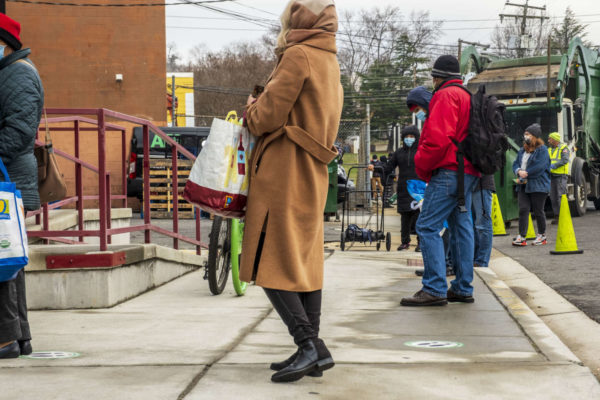
Sally Diaz-Wells, who coordinates the food pantry at Our Lady Queen of Peace Catholic Church in Arlington, just got the weekly egg bill.
It was $2,000, which makes up nearly 20% of the church’s weekly budget of $12,000 for purchasing food for distribution.
Arlington Food Assistance Center CEO Charles Meng says the wholesale price for a dozen eggs in January 2021 was $0.98. This month, AFAC paid $4.45 per dozen. Overall, food prices are up 35% for AFAC, which is already over its $1.3 million budget by $160,000.
The uptick in food prices, driven largely by inflation, is squeezing local food and meal distributors, which are at the same time seeing more Arlington residents come, and come more often, for free food. Inflation again is to blame for this, as clients report their earnings are covering less of their grocery bills, local food assistance providers said during an Arlington Committee of 100 panel on hunger held Wednesday.
“These numbers are not pandemic-related numbers,” Meng said. “These are numbers related to the basic need in Arlington, plus the burdens based on our families by inflation in particular.”
Providers say this is hitting the working poor the worst.
“This group comes to us when they need us, once or twice a month,” Meng said. “When their other benefits start running out, they’ll come to us more often.”
They tend to come after paying for other necessities like rent, utilities and medical expenses, says Stephanie Hopkins, the food security coordinator for Arlington County Department of Human Services.
“We find that people spend their available income on rent, utilities and medical expenses, and other bills, and if there’s enough money to pay for food, they will pay for their own food,” she said. “If there’s not enough money, that’s when they lean on food assistance network.”
More families who otherwise would be able to pay are leaning on Arlington Public Schools for meals, too, says Amy Maclosky, the director of the Office of Food and Nutrition Services for APS.
“Student meal debt has increased a lot this year and it has increased for paying students,” Maclosky said. “Every student is entitled to a free breakfast and lunch, whether they have the funds or not, but they do incur debt. Our debt is up $300,000 right now among people who do not qualify for free or reduced but aren’t able to pay.”
The rising need for food assistance needs comes as Arlington County is preparing to launch this month a Food Security Coalition tasked with implementing some two dozen strategies for tackling hunger.
Food insecurity affects about 7% of Arlington residents — 16,670 people — says Hopkins. It disproportionately affects people of color: 53% and 20% of AFAC clients are Hispanic or Latino and Black, respectively, while comprising 16% and 9% of the county’s population.
Food insecurity can mean “‘I’m worried that my food will run out before I have enough money to get more,’ to ‘I have zero food in my house,” Hopkins said. “We know there are people on both ends of that spectrum in Arlington and people journey that spectrum all the time.” Read More

(Updated at 1:35 p.m.) After seven years, the executive director of local nonprofit Arlington Thrive, Andrew Schneider, is stepping down.
“After much reflection and discernment, I have decided to step down as Executive Director of Arlington Thrive to pursue other opportunities,” Schneider announced in an email Wednesday evening. “It has been an absolute pleasure to work with you to deliver Arlington Thrive’s mission over the past seven years.”
Arlington Thrive provides direct, emergency financial assistance to eligible residents to pay for unexpected medical expenses, rent and utility payments, “and other crippling expenses,” according to the website. Originally a faith-based nonprofit addressing community needs, the nearly 50-year-old organization rebranded in 2013 as Arlington Thrive to “embrace our vision of progress, which includes all Arlingtonians regardless of creed.”
When the pandemic hit, requests jumped seven times over requests made in 2019, and the nonprofit worked with Arlington County and many other nonprofits to ensure people weren’t evicted and had food on the table. Schneider said Thrive served thousands of families during the pandemic and managed more than $10 million in eviction prevention assistance.
Beyond pandemic-era assistance, under Schneider’s leadership, the organization transitioned went from being a volunteer effort to a nearly all-virtual, “technology-forward operation,” and launched two initiatives, one focused on child care and another on bringing together local clergy of all creeds, community leaders and nonprofit staff to address community needs, per his email. In addition, the nonprofit has worked with local nonprofit Arlington Community Foundation, elected officials and the Arlington County Department of Human Services to improve the safety net for vulnerable residents.
Reflecting on his tenure, he told ARLnow in a statement that everything he set out to do as has been accomplished.
“Now seemed like the right time for me to step back,” he said. “We have a terrific team and committed board in place, with systems that were battle-tested through the pandemic and are now ready for whatever may come next. When I considered my personal situation, with two children approaching high school graduation, my long-term career goals, and the fact that leading Thrive has been an all-consuming and exhausting task, especially since March 2020, I realized it was time to move on.”
Despite all those efforts, he says two fundamental issues hold Arlington back.
“First, many low-income families, despite the safety net’s best efforts, struggle to remain in Arlington,” he said. “Costs for housing and childcare are very high, and access to affordable housing is limited, dwindling, and difficult to obtain. Secondly, there are remaining structural issues related to inequity and injustice which we are working to address. We are fortunate to have a strong network of nonprofits and faith-based organizations in Arlington who are committed to working together to ensure that Arlington remains a diverse community where all neighbors can thrive.”
But Schneider says he has confidence in the interim CEO, Susan Cunningham, as well as Thrive’s Board and its strategic framework to move the organization forward and select a new leader. Cunningham recently served as the interim CEO of affordable housing nonprofit AHC, Inc., steering the ship after Walter Webdale retired amid reports of poor conditions and maintenance at its Serrano Apartments complex on Columbia Pike.
“Susan brings extensive experience leading nonprofits and community organizations,” the outgoing executive director said in his email. “She is already working closely with us to ensure a smooth transition.”
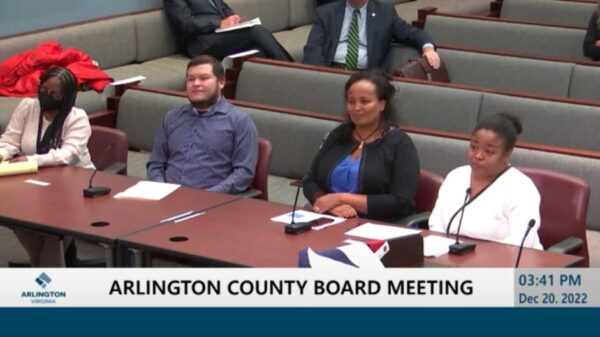
The informal, relationships-based advocacy at the core of the “Arlington Way” makes it harder for nonprofits led by and serving people of color to receive county funding, Arlington County Board Chair Katie Cristol says.
She tells ARLnow these concerns were raised by leaders of color, and she is working on a resolution — that could be voted on by the County Board this month — to change the status quo. The resolution will incorporate recommendations made by a small group of leaders representing local nonprofits.
At the top of their list is a fairly simple concept: a formal application process. Right now, Cristol says, the county uses an “ad hoc” process that doesn’t “live up to our values of transparency and access.”
Meanwhile, a decades-old, community-based program that identifies small infrastructure improvements is confronting a longstanding criticism — which leadership says is backed up by fresh data — of favoring projects in wealthier, whiter neighborhoods.
Community leaders presented updates on these efforts to the Arlington County Board last month. The moves are part of the county’s work to apply its 2019 equity resolution to policy-making and the newest contribution to the Board’s ongoing discussion of problems with the “Arlington Way,” the moniker given to the public process that informs policy-making.
The process often rewards those who are most civically active, connected and vocal about a given issue. But not always: it also frustrates those who follow the civic engagement playbook only to have the Board vote the other way.
“We heard some truthful feedback about how the ‘Arlington Way’ — for the many things it has achieved and its, at times, positive contributions to the community — also has some real downsides,” Cristol said in the Dec. 20, 2022 meeting. “It has been a way of doing things that lacked transparency and access, has prioritized relationships over fairness, and at times, it feels like it is reflective of predetermined outcomes.”
As part of the annual budget, the county awards grants of up to $50,000 or $100,000 for nonprofits serving low- and moderate-income residents, such as employment programs for people with disabilities, after-school programming for immigrant youth and financial planning assistance for families at risk of homelessness.
Leaders of local organizations say the county needs to do a better job of publicizing when funding is available and helping grassroots groups with the application process.
“This part was important for us, particularly for smaller organizations who don’t necessarily have the bandwidth or knowledge in the grant-making cycle that other larger organizations have,” said Cicely Whitfield, the chief program officer for the homeless shelter Bridges to Independence.
This could involve providing clearer deadlines and technical assistance, as well as feedback and workshop opportunities for nonprofits that are denied funding so they can apply successfully.
The group says the county should defer to organizations, which have a better sense of what the community needs, and ask for input on applications from people who would benefit.
Board Member Libby Garvey supported the changes but warned they could be controversial.
“There’s that saying, ‘I’m here from the government and I’m here to help you,’ and that’s supposed to be scary. It’s really because what it often means is, ‘I’m here from the government and I’m here to tell you what you need.'”
The sentiment applies to the Arlington Way, she says.
“We may find a little reaction from this, that ‘This is not the Arlington Way,'” she said. “We’re going to have to figure out ways to bring along everyone and explain… ‘This is going to be better and here’s why.’ We’re going to have work to do with the other part of the community that maybe is usually included.”
There is a three-decade-old program where the county acts on needs identified by residents: the Arlington Neighborhood Conservation Program, now known as the Arlington Neighborhoods Program (ANP).
The downside of this program is that it has “equity liabilities,” County Board Member Takis Karantonis said.
He said the model works for “community members who could afford to go to the meetings, who could afford to make a methodical evaluation of the state of sidewalks, or lack of sidewalks, or lack of public lighting… and fight for funding in a competitive but orderly manner.”
Although not a new criticism, ANP Chair Kathy Reeder provided the County Board with new data suggesting the program has disadvantaged less wealthy, more diverse neighborhoods.

